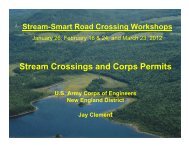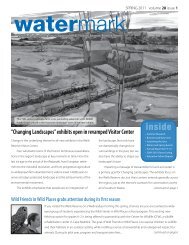Management Plan - National Estuarine Research Reserve System
Management Plan - National Estuarine Research Reserve System
Management Plan - National Estuarine Research Reserve System
You also want an ePaper? Increase the reach of your titles
YUMPU automatically turns print PDFs into web optimized ePapers that Google loves.
X. <strong>Research</strong> and Monitoring <strong>Plan</strong>IntroductionStrategiesThe Wells <strong>Reserve</strong> <strong>Research</strong> Program studiesand monitors change in Gulf of Maine estuaries,coastal habitats, and adjacent coastal watersheds,and produces science-based information needed toprotect, sustain, or restore them. In a typical year,the program directs or assists with more than 20studies involving dozens of scientists, students,and staff from the <strong>Reserve</strong>, academic and researchinstitutions, resource management agencies, andenvironmental and conservation groups.Wells <strong>Reserve</strong> scientists participate in research,monitoring, planning, management, and outreachactivities locally, regionally and nationally. Theprogram supports field research along Maine’ssouthwest coast from the Kennebec River to thePiscataqua River, including nearshore and offshorewaters. Within this region, effort is focused onthe coastal compartments from Great Bay, N.H.,to Casco Bay, Maine, which are characterized bynumerous marsh-dominated estuaries and barrierbeaches.The Wells <strong>Reserve</strong> <strong>Research</strong> Program will continueto focus its efforts on investigations of coastal foodwebs, the habitats that support them, and thehuman-mediated and natural disturbances thatalter them. In addition, we will continue to activelypromote the development and implementationof regionally coordinated ecological monitoringof coastal habitats along the gradient of least disturbed,to restored, to most disturbed. This will beaccomplished through committee work, meetings,workshops, presentations, and reports. New effortswithin the <strong>Research</strong> Program include the developmentof programmatic ties with one or moreacademic institutions.Objectives and StrategiesObjective 1Investigate coastal food webs and habitats, theirunderlying physical and biological processes, andtheir response to natural changes and humanactivities.◊◊◊◊◊◊◊◊◊Investigate the ecology of estuarine and coastalhabitats and food webs along the Gulf ofMaine.Evaluate the effectiveness of coastal habitatrestoration along the Gulf of Maine.Support investigations regarding salt-marshfish production.Support investigations regarding the quantityand quality of estuarine and watershedresources.Promote the investigation of linkages betweenestuaries and open water in the Gulf of Maine.Promote a landscape ecology approach to theconservation of coastal lands and watersheds.Collaborate with other agencies to determinecoastal research needs relevant to resourcemanagement, and conduct research projects tomeet those needs.Participate in system-wide scientific workgroups addressing how wetlands, estuaries,and nearshore ecosystems respond to land usewithin coastal watersheds.Provide scientific support for education, outreach,and training efforts to manage andprotect freshwater and tidal shorelands inwatersheds.Objective 2Provide visiting investigators and staff with opportunitiesto conduct independent or collaborativeresearch at the <strong>Reserve</strong> and in the Gulf of Maineregion.Strategies◊ Train and mentor undergraduates, graduatestudents and citizen volunteers.◊◊◊Support visiting researchers by providingaccess to facilities, field sites, staff and interns.Participate in the NOAA Graduate <strong>Research</strong>Fellowship Program and offer opportunitiesfor graduate research fellows to make contributionsin their chosen field of research.Cultivate programmatic affiliations withacademic institutions, and collaborate withinstitutions on specific research projects.78 Wells <strong>National</strong> <strong>Estuarine</strong> <strong>Research</strong> <strong>Reserve</strong>




